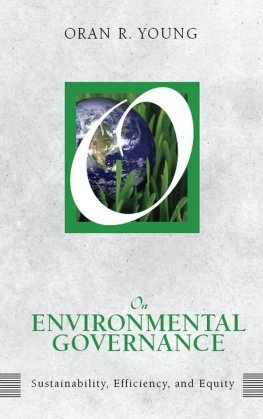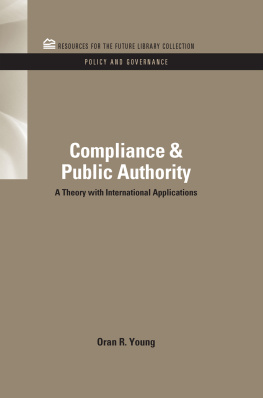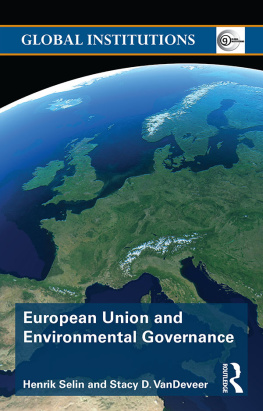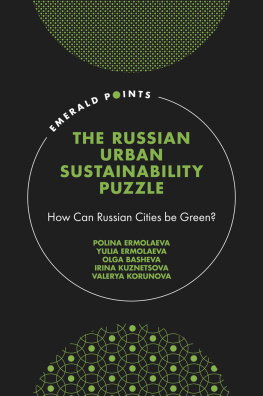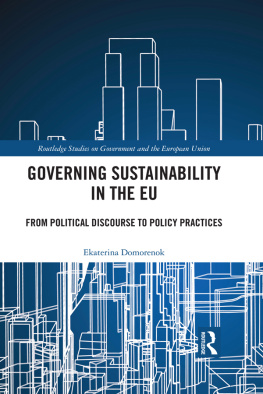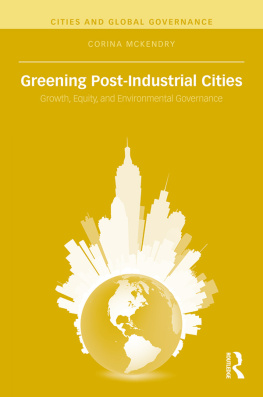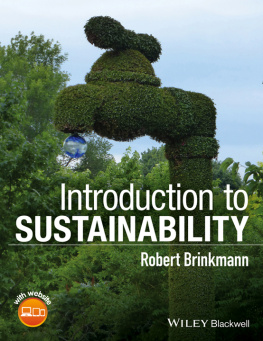ON ENVIRONMENTAL GOVERNANCE
ON POLITICS
L. Sandy Maisel, Series Editor
On Politics is a new series of short reflections by major scholars on key subfields within political science. Books in the series are personal and practical as well as informed by years of scholarship and deliberation. General readers who want a considered overview of a field as well as students who need a launching platform for new research will find these books a good place to start. Designed for personal libraries as well as student backpacks, these smart books are small format, easy reading, aesthetically pleasing, and affordable.
Titles in the Series
On Foreign Policy, Alexander L. George
On Thinking Institutionally, Hugh Heclo
On Ordinary Heroes and American Democracy, Gerald M. Pomper
On the Presidency, Thomas E. Cronin
On Appreciating Congress, Louis Fisher
On Legislatures, Gerhard Loewenberg
On Media, Doris A. Graber
On Environmental Governance, Oran R. Young
ORAN R. YOUNG
ON ENVIRONMENTAL GOVERNANCE
Sustainability, Efficiency, and Equity
First published 2013 by Paradigm Publishers
Published 2016 by Routledge
2 Park Square, Milton Park, Abingdon, Oxon OX14 4RN
711 Third Avenue, New York, NY 10017, USA
Routledge is an imprint of the Taylor & Francis Group, an informa business
Copyright 2013, Taylor & Francis.
All rights reserved. No part of this book may be reprinted or reproduced or utilised in any form or by any electronic, mechanical, or other means, now known or hereafter invented, including photocopying and recording, or in any information storage or retrieval system, without permission in writing from the publishers.
Notice:
Product or corporate names may be trademarks or registered trademarks, and are used only for identification and explanation without intent to infringe.
Library of Congress Cataloging-in-Publication Data
Young, Oran R.
On environmental governance : sustainability, efficiency, and equity / Oran R. Young.
p. cm. (On Politics)
Includes bibliographical references and index.
ISBN 978-1-61205-132-1 (hardcover : alk. paper) ISBN 978-1-61205-133-8 (pbk. : alk. paper)
1. Environmental policy. 2. Environmental protection. 3. Sustainability. 4. Environmental justice. I. Title.
GE170.Y683 2012
333.7dc23
2012003114
ISBN 13: 978-1-61205-132-1 (hbk)
ISBN 13: 978-1-61205-133-8 (pbk)
To our children and grandchildren, who will confront the environmental challenges of 2050

When Jennifer Knerr approached me with the idea of writing On Environmental Governance as a volume in Paradigms On Politics series, my first reaction was one of skepticism. Although I have transitioned from active teaching status to emeritus/research professor status, I find that I am just as busy as ever. My latest theoretical work is appearing in places like the Proceedings of the National Academy of Sciences and the International Studies Review. The areas I focus on in my applied workclimate, the oceans, the polar regionsare all hot topics in policy circles at this time. I am fortunate enough to have opportunities to communicate my thoughts about matters of governance arising in these areas to a variety of audiences on a regular basis. I am engaged in active collaborative efforts with colleagues in places as far apart as China and Iceland. So I thought to myself that there simply is not room to fit a project like this book into my schedule.
On reflection, however, I realized that I needed to revise my priorities. This project would offer an excellent opportunity to lay out the main lines of my thinking about environmental governance as they have developed over the last forty years and present them in a form that any interested reader could absorb without making a major investment of time. This point was brought home to me in a conversation with my adult daughter, who has a lively interest in environmental governance but is not in a position to invest a large chunk of time in reading a longer and more academic book on this topic. She observed, Im really curious about environmental governance, and of course, Id like to have a better understanding of what you do. But my life is so busy that I have limited time to read, much less give a more formal, academic work the focus and time it requires. On Environmental Governance sounds like exactly the sort of book Id really enjoy. My guess is that many will share her reaction. No doubt, a sizable proportion of those who read this book will be students who encounter it as a reading assignment on a course syllabusthat is all to the good. But I am particularly excited by the prospect that the readership for this book may extend to members of a larger reading public who are aware that there are complex and important governance questions relating to areas like climate change, the oceans, and the polar regions but have neither the time nor the background to plunge into the more formal literature in this field. This book is for them!
For these readers I should emphasize that the book is not about providing simple answers. You will not find here neatly packaged recommendations about how to break the impasse in efforts to strengthen the climate regime or whether to push toward negotiating a legally binding treaty for the Arctic. Rather, my objective is to provide a coherent framework for thinking about such matters and to develop a mode of analysis that can yield concrete recommendations regarding specific issues arising in specific places at specific times. The key to the process lies in what I call institutional diagnostics. Just as we would expect an architect to design a building well suited to relevant biophysical conditions, economic circumstances, and intended uses, we should expect those seeking to design governance systems to recommend arrangements that fit well with all the pertinent biophysical and socioeconomic conditions. There is no reason to assume, for instance, that what worked when dealing with the depletion of stratospheric ozone will solve the climate problem or that what worked in addressing the challenges of the Antarctic will work in the Arctic. But the practice of institutional diagnostics can draw on lessons derived from experience with other cases in the process of developing plans that have a reasonable prospect of proving successful in current situations.
As I explain in the body of the book, there is a growing urgency about improving our ability to address challenges of environmental governance. Increasingly, we inhabit a human-dominated planet where the activities of human beings collectively are responsible for major changes on the Earth on a planetary scale. The problem of climate change is only the most prominent example of a growing class of challenges of this sort. For our own sake as well as for the well-being of the Earths other inhabitants we must find ways to govern human behavior so as to avoid the destructive consequences of our actions without sacrificing social welfare. For anyone who expects to be alive in 2030 to 2050, this is likely to become an overriding concern.






